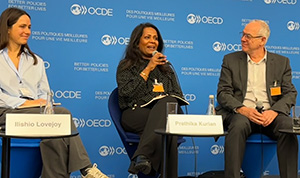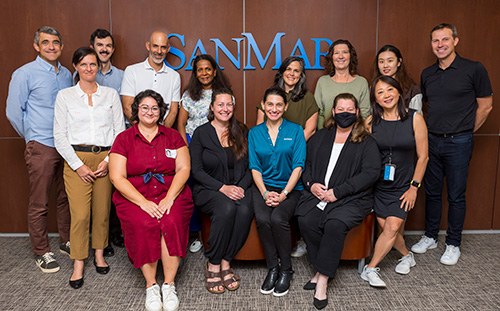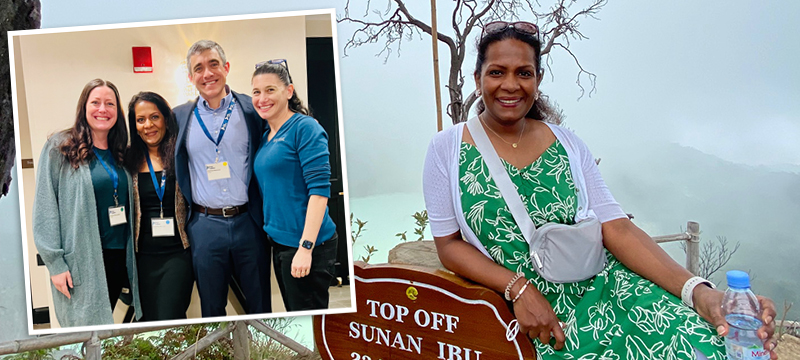The first time Prathika Kurian heard of SanMar was about 10 years ago, in one of her favorite places in the world, Sri Lanka.
“I was there visiting a local factory and I noticed some boxes that said ‘Port Authority’ and ‘Issaquah,’” she recalls. When she asked about it, the factory management told her about SanMar. They liked working on Port Authority because the fabrics, colors and styles stay mostly consistent over time, which helps them do better work. At this point, she says, “SanMar was now on my radar.”
Prathika was talking to factory workers often around that time as part of her factory compliance work. “The best way to learn is to be quiet and listen,” she says, whether it’s listening to and understanding the workers’ experiences or listening to the concerns and priorities of her fellow board members on the Fair Labor Association. Listening has been a part of her career from a factory sampling room many years ago to her current position at SanMar as a Senior Manager of Factory Compliance.
The Evolution of Compliance
You might hear her title and wonder what that means. If you’ve been following news about labor rights in the clothing and shoe industries, you may have come across this term. Compliance officers are responsible for ensuring that factories adhere to an established code of conduct, such as the Fair Labor Association’s (FLA) Fair Labor Code. They work with social organizations and corporations to protect the safety and rights of workers.
Prathika is one of those people, and it’s work that is always evolving.
It was nearly 20 years ago when she first started helping companies address workers’ rights in a more formalized way. “I was already working directly with factories to give them garment construction specs, as well as quality and testing standards,” she says. “Compliance was something newer then, and the bigger retail brands were starting to develop a code of conduct.”
Since Prathika had experience working in a factory and was in regular contact with the factory workers, she was asked to help develop her supplier’s code of conduct. “It just kind of fell into my lap,” she remembers. It turned out to be a pivot that defined her career from that point on.
A Little Bit of Everything
Prathika first studied at the National Institute of Fashion Technology in India, while working in sampling rooms at local small factories. She soon relocated to the United Kingdom to complete her Masters degree in Fashion Marketing and moved into the role of production and technical designer at a UK fashion supplier. “We looked at color, fabric, fit, quality…the way the role worked was that you had to be able to do a little bit of everything,” Prathika recalls.
 After years in the supplier world, in 2012 she moved on to Bonmarché, a UK retailer, as a specialist in their apparel product safety and fit. Her work with factory compliance never really left her, though, and in about a year she took on her biggest role yet: Global Social and Ethical Compliance Officer and Senior Technical Designer. “I was still multitasking,” Prathika says with a laugh. “I was writing the company codes of conduct while creating technical specs at the same time.”
After years in the supplier world, in 2012 she moved on to Bonmarché, a UK retailer, as a specialist in their apparel product safety and fit. Her work with factory compliance never really left her, though, and in about a year she took on her biggest role yet: Global Social and Ethical Compliance Officer and Senior Technical Designer. “I was still multitasking,” Prathika says with a laugh. “I was writing the company codes of conduct while creating technical specs at the same time.”
It was during this time that she started engaging with the Ethical Trading Initiative (ETI) in Europe, and had a hand in helping to shape what would eventually become the Modern Slavery Act in the UK, enacted into law in 2015. It was also around this time that she saw those SanMar boxes in a factory in Sri Lanka.
Making Big Moves
A couple years later, Prathika was living the United States. She had enjoyed a summer in Seattle and started looking for jobs in the area. When an opening for a Corporate Responsibility Specialist became available, she remembered SanMar from her factory visit.
“It seemed so different from what I’d done before,” Prathika remembers thinking. She had seen the human cost of fast fashion, and she could tell early on that SanMar was unique. “Once we have a fabric that’s approved we don’t usually change it,” meaning that workers can develop muscle memory and work at a reasonable pace with fewer quality issues. “From a selling standpoint, SanMar is a high-volume supplier,” Prathika says, “but from a production standpoint, we’re the opposite of fast fashion.”
While at SanMar, Prathika has been able to not only see the difference in the approach to how promotional apparel is made, she’s helped to evolve it. “We measure our progress through a lot of data,” she says, “and no case is ever the same.” She’s been able to grow her team over time, both locally in the States and internationally, so that team members are on the ground to listen and address issues more quickly.
Working Toward a Shared Goal
SanMar was already an accredited member of the Fair Labor Association when Prathika joined the team, and she worked to help earn re-accreditation in 2023. During this process she learned that a position on the FLA Board of Directors had opened up, and heard feedback that it would be good to have SanMar represented at the table. She was elected as a member in 2022 and has enjoyed the added voice in the organization.
“Being a part of the FLA means we’re working toward the same goal,” Prathika says. “We get to learn what works and what doesn’t from other retailers, and we can work on issues as a group. We have a say in how the organization evolves.” Her habit of listening helps her here too – she learns from the legacy knowledge of other members on the board, offers her own perspective and has the opportunity to weigh in and vote on things she cares about.
Singing the Same Song
One constant in Prathika’s work is that she’s always had great relationships with the factories she works with. “But other jobs were often stressful,” she remembers. “This is the only role I’ve ever had where I wake up and I’m happy about my work.”

Part of the reason for that is the support she gets from the SanMar leadership team. She knows that they’re all on the same page. “We communicate, we’re dialed into each other’s work, we’re all singing the same song. You can’t make that up!”
She also gets to travel and see some of her favorite places, like Sri Lanka. “The people are so humble there, and it’s so beautiful.” She finds familiarity with her Indian heritage in their culture and food. When she’s not traveling, Prathika is sometimes in the office and often at home, devoting her time to her son, who she adores.
Things have changed a great deal since Prathika started working in the factory compliance field. Customers now expect companies to do the right thing, and she finds she can rely on the SanMar value of simply being nice. “We’re nice to customers, suppliers and each other,” she says. “I love knowing that we’ve made a positive change in people’s lives.”
